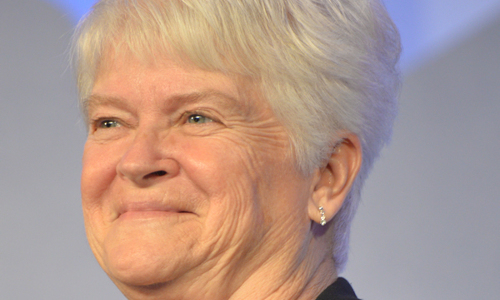BY CHRIS JOHNSON, WASHINGTON BLADE

Barronelle Stutzman of Arlene's Flowers is seeking the Supreme Court's OK to refuse service to gay couples. Washington Blade file photo by Michael Key
A Washington State florist who refused to service a gay couple's wedding for religious reasons is calling on the U.S. Supreme Court to reverse state court rulings that she violated the state's LGBT non-discrimination law.
Barronelle Stutzman, the sole owner of Arlene's Flowers in Richland, Wash., filed the petition for certiorari on Friday before the U.S. Supreme Court asserting the rulings against her violate her freedom of speech and religion.
Stutzman, who denied floral arrangements in 2013 for the same-sex wedding of Rob Ingersoll and his spouse Curt Freed, said in a statement her refusal to serve their wedding had nothing to do with them being gay.
"Rob Ingersoll and I have been friends since very nearly the first time he walked into my shop all those years ago," said Stutzman. "There was never an issue with his being gay, just as there hasn't been with any of my other customers or employees. He just enjoyed my custom floral designs, and I loved creating them for him. But now the state is trying to use this case to force me to create artistic expression that violates my deepest beliefs and take away my life's work and savings, which will also harm those who I employ. I'm not asking for anything that our Constitution hasn't promised me and every other American: the right to create freely, and to live out my faith without fear of government punishment or interference."
In February, the Washington Supreme Court decision upheld the ruling against Stutzman by the Benton County Superior Court, which found she violated the Washington Law Against Discrimination and fined her $1,000. The American Civil Liberties Union and Washington Attorney General Bob Ferguson led the charges against her resulting in the penalty.
The 54-page petition for certiorari presents two questions before the U.S. Supreme Court: 1) Whether the creation and sale of floral arrangements for weddings is artistic expression, and if so, whether compelling that creation violates the Free Speech Clause; and 2) Whether the compelled creation and sale of floral arrangements for weddings and attendance of that wedding against one's religious beliefs violates the Free Exercise Clause.
The petition argues Stutzman didn't refuse service based on discriminatory reasons because she had previously provided service to Ingersoll for purposes other than weddings and because she has employed LGBT people at her floral shop.
"Contrary to Respondents' claims, Barronelle does not engage in sexual orientation discrimination. Barronelle hires LGBT employees and serves LGBT clients on a regular basis…and she had a 'warm and friendly' relationship with Robert for over nine years, designing dozens of arrangements for him and Curt," the petition says. "But part of Barronelle's wedding business involves attending and facilitating the ceremony itself and Barronelle simply could not reconcile her faith with celebrating and participating in a same-sex wedding."
Representing Stutzman in the case is Alliance Defending Freedom, an anti-LGBT legal firm recently designated as a hate group by the Southern Poverty Law Center.
"If the government can ruin Barronelle for peacefully living and working according to her faith, it can punish anyone else for expressing their beliefs," Alliance Defending Freedom senior counsel Kristen Waggoner said in a statement. "The government shouldn't have the power to force a 72-year-old grandmother to surrender her freedom in order to run her family business. Anyone who supports the First Amendment rights that the U.S. Constitution guarantees to all of us should stand with Barronelle."
On the same day Alliance Defending Freedom filed the petition before the Supreme Court, it published a video titled "The Barronelle Stutzman Story," which depicts her as a sympathetic figure for facing penalties after refusing service to gay couples for religious reasons.
It remains to be seen whether the Supreme Court will agree to review the case, although that's unlikely to happen while justices are in recess during the summer. It takes a vote of four justices to agree to grant a writ of certiorari — or agree to take up a case.
If justices agree to review the decision against Stutzman, they would heard the case at the same time they're considering a lawsuit filed by Masterpiece Cakeshop in Colorado, which is asserting a right to deny services to same-sex couples based on religious objections. Alliance Defending Freedom is the counsel to the plaintiffs in both cases.
The petition itself asks the Supreme Court to consider both cases simultaneously, or at least hold the Arlene's Flower's petition until a decision is handed down in the Masterpiece Cakeshop case.
"Reviewing the two cases together would aid this Court in deciding the important First Amendment questions presented," the petition says. "The record in this case is particularly well developed and comprehensive, including numerous depositions and declarations, as well as expert testimony. Such exhaustive evidence will facilitate the Court's "independent examination of the record as a whole" to determine whether artistic expression, like Barronelle's custom floral designs, are 'protected speech.'"










